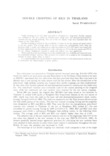Double Cropping of Rice in Thailand
Tropical agriculture research series : proceedings of a symposium on tropical agriculture researches
| ISSN | 03889386 |
|---|---|
| 書誌レコードID(総合目録DB) | AA00870529 |

本文フルテキスト
tars20-_23-28.pdf1.03 MB
Single cropping of rice has been practiced in Thailand for a long time. Double cropping was initiated in the late sixties in limited areas using local, tall photoperiod-insensitive varieties for the second planting. The use of the dry season crops was expanded after the release of the Thai HYVs.
Double cropping is limited by the availability of water in the dry season and good control in the wet season. The average yield in the dry season was substantially lower than the potential yield. A study was conducted on yield constraints in 1974-1977 and it was found that fertilizer application was the main factor in the yield gap, i.e. 55% in the wet season and 75% in the dry season. Inadequate control of weeds and insects was less significant.
Direct seeding of pre-germinated rice in the puddled soils was modified and improved from the traditional farmers' practice. This practice was found to be as good as the transplanting method in areas where labor is scarce.
It is recommended that future research sould be directed towards minimization of the cost of production and improvement in grain quality.
Double cropping is limited by the availability of water in the dry season and good control in the wet season. The average yield in the dry season was substantially lower than the potential yield. A study was conducted on yield constraints in 1974-1977 and it was found that fertilizer application was the main factor in the yield gap, i.e. 55% in the wet season and 75% in the dry season. Inadequate control of weeds and insects was less significant.
Direct seeding of pre-germinated rice in the puddled soils was modified and improved from the traditional farmers' practice. This practice was found to be as good as the transplanting method in areas where labor is scarce.
It is recommended that future research sould be directed towards minimization of the cost of production and improvement in grain quality.
| 刊行年月日 | |
|---|---|
| 作成者 | Suvit PUSHPAVESA |
| 公開者 | Japan International Research Center for Agricultural Sciences |
| 巻 | 20 |
| 開始ページ | 23 |
| 終了ページ | 28 |
| 言語 | eng |
